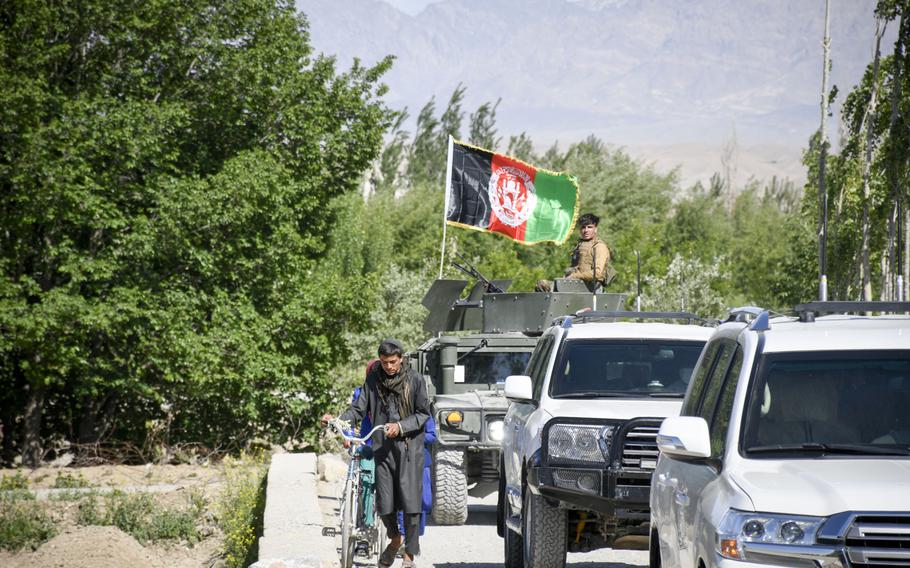
A convoy belonging to Abdul Qayum Rahimi, governor of the province of Logar in Afghanistan, travels through Taliban-contested territory during a cease-fire May 14, 2021. Logar residents are pessimistic about the prospect of peace in the country as U.S. and coalition troops withdraw. (J.P. Lawrence/Stars and Stripes)
PUL-E-ALAM, Afghanistan – Cease-fires between the Taliban and Afghan troops allowed Hussain Qadri to visit his childhood home in a Taliban-contested village near a former U.S. base for the first time in two years.
The cease-fires, which were independently announced by the Taliban and the Afghan government to mark the Muslim holiday of Eid al-Fitr, brought respite to Joi Yak, the village where Qadri grew up. It’s located within walking distance of Pul-e-Alam, the capital of the strategically important province of Logar, about 40 miles south of Kabul.
But while Qadri, like others in the village that day, welcomed any amount of peace, he worried that the fighting would resume after the holiday with increased ferocity.
“The three-day cease-fire was very good for the Taliban,” said Qadri, an adviser to Logar’s governor. “They take rest, they complete logistical movements, they plan for attacks after the cease-fire.”
The Taliban control much of Logar province already and were fighting for more of it before the cease-fire. If a power-sharing agreement cannot be worked out, many here worry that the Taliban could use the area as a springboard to attack the nation’s capital.
“Logar is the gateway to Kabul,” said Huma Ahmadi, a member of parliament. The province is still recovering from an unclaimed bombing that killed at least 25, many of them students.
“It’s not the first time Logar has been attacked, it will not be the last,” she said.
Ahmadi met Friday in Pul-e-Alam with the provincial governor, Abdul Qayum Rahimi, whose armed convoy visited Qadri’s village. The governor wanted to meet with residents in areas normally too dangerous to visit. He and his men took selfies, listened to concerns, and gave children money and cookies.
“This is the way governance should be, we have to lessen the distance between the government and the people,” Rahimi said.
But residents of the village seemed wary of the governor’s convoy. The village’s main street was empty and people hid in their homes when the convoy arrived, only coming out to greet the governor after he left his vehicle to walk through the village on foot.
The reaction was a stark contrast to a cease-fire three years ago that led to mass celebrations in Pul-e-Alam and Logar province, with Taliban fighters coming to the city and rural citizens lining the streets to cheer on Afghan government troops.
The cease-fire this year proved more dour. Peace negotiations between the U.S. and the Taliban led to a deal last year to pull out American and coalition troops, but fighting between Afghan and anti-government forces only intensified in the country, including in Joi Yak.
One resident, Abdul Hamid, said that while he welcomed the respite from violence, it wasn’t enough.
“I want it to be forever, not just three days,” Hamid said.
The governor, Rahimi, said he understands why the citizens are pessimistic.
“People see a war coming after the cease-fire,” he said.
History shows the Taliban fight even harder after celebrating the Eid holiday, said the commander of U.S. forces in Afghanistan, Gen. Scott Miller, in an interview this week with CBS News.
Logar province has seen more fighting since the closure of U.S. base in the province, Camp Dalhke, part of the larger base known as Forward Operating Base Shank.
Afghan forces will try to secure the province without American airpower or advisers, Rahimi said. They will shift away from some U.S. fighting methods and equipment — no more Humvees, which he called ill-suited to the rocky terrain in Logar. Instead, they’ll travel in regular cars and motorcycles like the Taliban do.
“You have to be a guerrilla to fight the guerrilla,” he said. He added that while “Shank,” the former U.S. base he inherited is “ruins,” he will fix up the compound and plant hundreds of trees in hopes of developing a training center there.
Rahimi said it was important to defend the gains of the last two decades since the U.S. came to Afghanistan: the education for its youth — many of them women — and better infrastructure, including roads and cellphone towers. He said he was grateful to the Americans who came to Afghanistan to fight, but he was also mad that they were leaving the country in a bad situation.
“The international community should not leave Afghanistan to its fate,” he said. “Do not leave us in chaos.”
Nawab Momand contributed to this report.
lawrence.jp@stripes.com Twitter: @jplawrence3